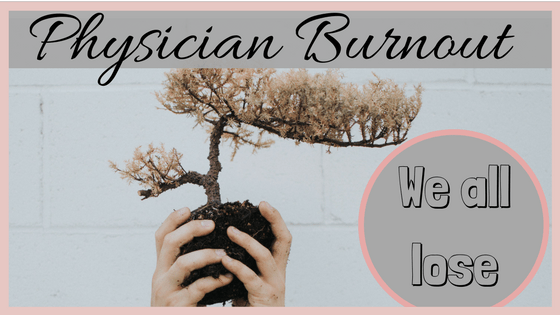Despite loving my patients, I burned out. I chose my own quality of life over continuing to work with the chronically mentally ill population that I adored. This patient population is frequently shortchanged with their quality of care and I have joined the ranks of people failing them.
Physician burnout
This is my experience working in one mental health clinic in the United States. Every clinic runs differently and there are fantastic systems out there. I am so grateful for the amazing clinicians and psychiatrists that continue to dedicate their lives to this population even when they are underpaid and overworked.
We go into medicine to treat patients, yet systems issues can destroy our resilience and prevent us from doing what we love. Instead of facilitating care, dysfunctional systems drive away physicians and make it harder for patients to get quality treatment.
The stress of funding mental health clinics:
It’s not surprising many clinics aren’t well-run given the stress of funding them. Care for the chronically mentally ill population isn’t prioritized and is poorly reimbursed.
- Parity laws, which mandate equal pay for mental health treatment as compared to other medical treatments, have been inconsistently followed by insurance companies. Significant differences in reimbursement remain even when the same procedure code is used by a psychiatrist vs a physician in another specialty. The laws are not enforced and insurance companies continue to get away with it.
- Many clinics rely on public funding to stay afloat. This funding continues to get cut.
With frequent budget cuts, leadership had an incredibly difficult job worrying about financial solvency. This trumped all else. Obviously, if your house is on fire you aren’t going to start rearranging the furniture. However, when you realize fires are a new norm you need to be proactive; to minimize damage and also continue to make your house the best it can be.
Mental health clinic safety:
Our clinic had safety issues that desperately needed to be addressed. For years I tried to address them by suggesting changes that were common sense and cost little to no money.
Leadership agreed to make these safety changes but never carried them out. I began to feel like they didn’t have our backs and were too overwhelmed by fundraising to care about “mundane” issues like patient and staff safety.
Inefficiency or Incompetence?
I started to feel burned out. Defeated and powerless. The patients brought me so much joy, but the system was depleting it. I lost faith in the leadership and could no longer excuse inefficiencies as a byproduct of clinic work but more indicative of incompetence. Our safety was being put in jeopardy and leadership turned a blind eye.
Example:
The kitchen was centrally located and had open doors on either end that led to the clinic hallways. The kitchen doors had no security system even though key fobs were already in use separating the waiting room from other areas.
Every time a birthday was celebrated a large pointed carving knife was used to slice the cake. This knife would be washed and put in the drying rack next to the open door; visible to all who walked by. This seemed like an obvious safety concern.
My suggestion was to put a key fob on the kitchen doors to limit patient access. The costs would be minimal. After a year of expressing my concerns about safety, leadership finally agreed to put the fob on the doors. However, after another year of waiting, they never followed through.
A recipe for physician burnout:
During the same years that I was unsuccessfully attempting to improve clinic safety, appointment time was reduced from 20 to 15 minutes and we switched to electronic medical records. Patients in individual therapy were shifted into groups. No one had the time to listen to and care for our patients anymore.
Patients and staff ended up feeling unheard and marginalized together; both of us sharing a lack of positivity and lack of hope that we could improve our environment to create a brighter future.
What was lost when I chose to leave:
When I left the clinic, it was because I could no longer tolerate a system that wouldn’t improve. For me, it meant leaving my patients who I worked for 9 years to engage. Trusting therapeutic relationships don’t come easily in this population and I treasured that they allowed me to share in their lives.
When I left, my patients lost a physician who cared about them and their quality of life. They lost a human connection when they may have no one else. I knew they loved chocolate milk, meatballs, and smoking. They also loved to play basketball, wrote raps and poetry, and didn’t eat if they were too distracted to go to the soup kitchen. I knew what their early relapse signals were and how to engage them enough to tweak medication in hopes of warding off hospitalization.
I’m replaceable.
I know I am not the only one that can do this work. I also recognize this is an area of physician shortage. Our most psychiatrically challenging and medically complex patient population is slowly being treated predominantly by locums tenens psychiatrists (who don’t have the time to build relationships) and mid-level practitioners (often newly graduated who now need to treat highly complex patients on multiple medications with multiple medical conditions).
Despite all this, I think I may have lost more than my patients. I lost part of my career purpose and the passion I had to find a way to engage and treat this population.
For now, I am grateful if I catch a glimpse of one of my beloved patients walking down the street or cross paths with them in town. I know you are alive. I hope you are well cared for. I’m sorry I left you.
We all lose when physicians burn out.
If you are looking for additional resources and information regarding mental health topics check out my Resources page and Mental Health Bookstore.






Excellent post on a topic that isn’t discussed enough.
Thank you for the insight into a physician’s mind.
Awesome awesome post! I was you for 5 mins, enjoyed reading every second of it!
A great write up and I never thought about this. You automatically assume being a physician you will never suffer these issues!
At my local surgery I have had many physicians leave. I now look back and wonder if this was the case with them.
Great topic! I can’t imagine you didn’t get more backing for safety issues. I have thought for a long time that physician burnout is related to the decreased autonomy we have. One of the reasons I’m not burned out now is I’m full partner and have a say in what happens. I don’t always get my way, but neither do other partners and we always have a say. Knowing you’re heard makes a difference. I get frustrated when insurance rules make things messy. I see other docs who work for a corporation get frustrated about everyday things. There is just too much pressure to not at least feel like you have the power to change how things are done to make improvements. I hope medicine can shift back to independent practices some day, but I don’t see that happening…
Yes, having some ability to make changes in your environment makes all the difference. It’s important to feel like we have some control. I am in solo private practice and similar to you, the only thing that can suck the life out of me is infuriating insurance prior authorizations. Luckily, there is so much I enjoy in my practice that these are a pretty minor blip in my day.
Taking care of yourself isn’t failing your patients – as Lisa Nichols says you have to serve from your overflow, not from your own cup. Hopefully that complete peace about your decision to leave that practice isn’t far behind!! It’s inspiring to hear the perspective of a doctor who cares so much about her patients.
Great post! This is such an important topic, especially with the chamging climate of the medical field. Thanks for addressing it!
This rings do close to home because I live in England and am part of the NHS but its struggling more than ever right now. I practice yoga and meditation and eat Mindfully. I am trying to encourage others too because we may not always have an nhs.
I love this! “Serve from your overflow, not from your own cup”. What a fantastic saying
Thank you for writing this and sharinf your thoughts. Burnout, especially in the arena of mental health, is so common and yet not discussed. I feel like you when having to support my patients and fighting tooth and nail to get them help but I have no support or resources to do my job adequately. In the end, I worry that something will fall through the cracks.
Wow what a great post and thank you Doc Melissa, and thanks for Liking my LinkedIn comment the other day on sobriety. I have a blog and a website and getting people to comment and engage is tricky but we are gaining traction for sure and I am grateful, I am commenting here because I was here and it’s the right thing to do and lurking isn’t right or cool. Doc I hear what you are saying and I did read the entire post…yes the system is messed up especially with all the electronic billing as it opens the doors to fraud, over billing, and “errors” which are in fact attempts at white collar extortion and fraud. Large knives in a clinical setting where people can grab them?!? NOT on my watch and not in my clinic I guarantee you that if I had one. Trigger warning beyond this point!! I was put into a “day care” center when I was 4.5 years old where I was savagely beaten, strangled, molested, and systematically tortured for about 8 months and I know first hand how devastating PTSD and trauma and depression can be but we can and do overcome and survive and thrive. I have met so many wonderful doctors and professionals on my journey who were hindered in their progress to help me by the system and I mean the money system, the greed system, and the main stream system. I would like to say more but I need to log off and go run and or get some sunshine and fresh air. God bless you and the work you are doing and anyone and everyone feel free to visit us at http://www.rewhiteconsulting.com and get engaged and leave a comment, don’t just lurk me but be with me and help us grow our ministry!!! Peace, love, light, and joy to everyone and have a great day!!!! 🙂 🙂
Thanks for the comment- so glad you were able to meet wonderful doctors and professionals along the way to help you overcome, survive and thrive as you say (sounds like a good mantra!) despite the broken systems that exist. Hope you enjoyed your run!